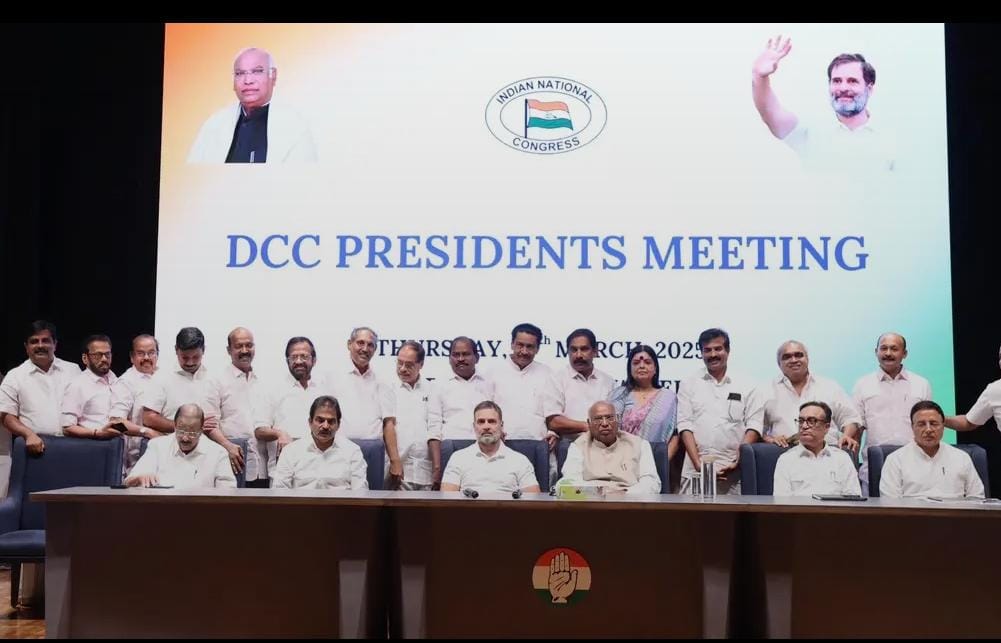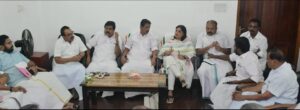Beyond the resignations themselves, party insiders are increasingly uneasy over the growing trend of private conversations making their way into the public domain.
Published Jul 30, 2025 | 12:05 AM ⚊ Updated Jul 30, 2025 | 12:05 AM

DCC presidents from Kerala with Congress leaders
Synopsis: The resignations of two senior leaders of the Congress’s Kerala unit within three days, following leaks of audio recordings of their private conversations, have left the party publicly embarrassed and internally paranoid. Though the party has launched internal probes to determine the sources of the leaks, the trend of private conversations ending up in the public domain has raised serious questions about its internal cohesion ahead of the fast-approaching polls.
The Kerala Pradesh Congress Committee has launched internal inquiries amid growing concern over covert surveillance and deepening factionalism.
In the span of just three days, the Congress party in Kerala has been rocked by the back-to-back resignations of two senior district leaders after audio recordings of their private conversations were leaked to the media, causing embarrassment to the state unit’s public messaging.
The developments have triggered unease within the party and raised serious questions about its internal cohesion ahead of the upcoming local body and 2026 Assembly elections.
The timing and nature of the resignations – one stemming from internal disillusionment, the other linked to alleged corruption – have sent shockwaves through party circles, exposing a worrying lack of organisational discipline and unity.
On Saturday, Thiruvananthapuram District Congress Committee (DCC) President Palode Ravi stepped down after an explosive phone conversation surfaced in which he is heard issuing a grim warning about the Congress’ future in Kerala, predicting a third-place finish in the next polls and warning of a deepening disconnect with the electorate.
His remarks, later described as a private cautionary message, directly contradicted the Kerala Pradesh Congress Committee’s (KPCC) public narrative of a comeback.
Though Ravi sought to downplay the controversy, the KPCC swiftly accepted his resignation and temporarily appointed senior leader and former Speaker N Sakthan as DCC chief.
Simultaneously, the party expelled Vamanapuram Block Congress Committee General Secretary A Jaleel for his alleged role in the audio leak and launched an internal inquiry led by disciplinary committee chief Thiruvanchoor Radhakrishnan.
Just as the dust was settling, another controversy erupted in Kannur on Tuesday, with DCC General Secretary KC Vijayan resigning from his post.
Kerala Pradesh Congress Committee (KPCC) President and MLA Sunny Joseph confirmed the development in an official statement, saying the resignation had been accepted.
Vijayan’s exit came amid serious allegations he levelled against Youth Congress leader Vigil Mohan.
In an audio clip, reportedly shared in a Sreekandapuram Block Congress leaders’ WhatsApp group and later leaked to the media, Vijayan accused Mohan and others of manipulating Youth Congress state elections using forged voter ID cards.
He also raised concerns about the alleged misuse of funds collected by the party for Wayanad landslide relief efforts, citing a lack of transparency.
Beyond the resignations themselves, party insiders are increasingly uneasy over the growing trend of private conversations making their way into the public domain.
Internal discussions, once considered sacrosanct, are now being discreetly recorded and leaked, raising concerns about surveillance from within.

A meeting convened by AICC general secretary Deepa Dasmunsi at Thiruvananthapuram DCC office on Tuesday
In the case of Palode Ravi, the KPCC is troubled not only by the content of the audio but also by the possibility that he may have been targeted in an ongoing factional tug of war – a spectre the party had long claimed to have buried.
His resignation has prompted the formation of an internal inquiry commission to probe whether deeper group politics were at play.
In contrast, the allegations made by KC Vijayan have opened the door to a more serious disciplinary review.
The KPCC is examining whether further action is warranted in light of the corruption claims involving forged voter IDs and alleged misuse of disaster relief funds.
Senior leaders privately admit that in the age of smartphones and viral social media content, even well-intended criticism – if aired without caution – can spiral into damaging controversies.
The message from the leadership is clear: organisational concerns must be addressed through internal channels, not WhatsApp groups or phone calls that could become tomorrow’s headlines.
Meanwhile, political observers see the twin exits as more than isolated incidents. They point to unresolved factionalism, poor crisis management and an erosion of trust within the Congress ranks.
(Edited by Dese Gowda)
